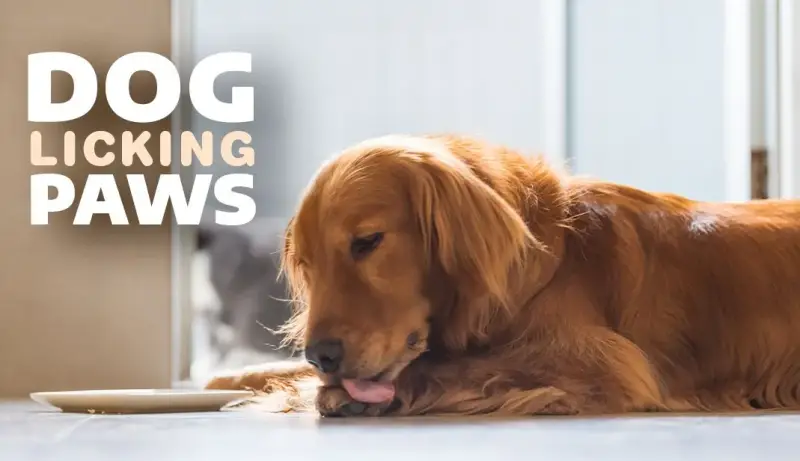As dog owners, we’ve all observed our furry friends licking their paws, but when it becomes repetitive or excessive, it often leads to questions about why they’re doing it. Is it just a habit, or could it be a sign of something more serious? Paw licking is a common behavior in dogs, and understanding why they do it can help us care for them better and ensure they stay healthy.
In this comprehensive guide, we’ll explore the various reasons why dogs lick their paws, from simple grooming to potential health concerns. By the end of this article, you’ll have a better understanding of when paw licking is normal and when it may be time to seek professional advice.
The Basics: Why Do Dogs Lick Their Paws?

Licking is a natural behavior for dogs, as it is an instinctual action they use to clean themselves and show affection. Dogs lick their paws for a variety of reasons, ranging from grooming habits to addressing physical discomfort. While occasional paw licking is normal, excessive or frequent licking can signal an underlying issue that requires attention. Below, we’ll dive deeper into the specific causes of paw licking in dogs.
1. Normal Grooming Behavior
One of the most common and benign reasons dogs lick their paws is simply to keep them clean. Just like cats, dogs are fastidious groomers. They often lick their paws to remove dirt, debris, and foreign objects that may have gotten stuck in their fur. This behavior is especially common after walks, when dogs encounter different terrains like grass, dirt, or puddles.
Signs of Normal Grooming:
- Occasional licking after outdoor activities.
- Short duration of licking.
- No signs of irritation, redness, or swelling on the paws.
If your dog licks their paws occasionally and it doesn’t seem excessive, it’s usually a sign of normal grooming.
2. Allergies: A Common Cause of Paw Licking
Allergies are a leading cause of paw licking in dogs. Whether the allergens are environmental (like pollen or dust mites) or food-related, they can trigger itching and irritation that lead dogs to lick their paws in an attempt to soothe the discomfort.
Types of Allergies That Can Cause Paw Licking:
- Environmental Allergies: These include seasonal pollen, mold, or dust mites, which can cause irritation on your dog’s paws, ears, and skin. In these cases, you may notice paw licking becoming more frequent during certain times of the year.
- Food Allergies: Certain ingredients in your dog’s food, such as grains, dairy, or meat, can cause allergic reactions that lead to itchy paws. Food allergies are often accompanied by gastrointestinal symptoms, such as vomiting or diarrhea.
- Contact Allergies: If your dog has contact with certain chemicals, like cleaning products or lawn treatments, it can lead to paw licking as a response to skin irritation.
How to Identify Allergies:
- Red, inflamed paws.
- Excessive licking or chewing of paws.
- Skin rashes or sores.
- Sneezing or watery eyes (for environmental allergies).
- Digestive issues (for food allergies).
If you suspect allergies are causing your dog’s paw licking, consulting your vet for allergy testing can help pinpoint the cause.
3. Dry, Cracked, or Irritated Paws
Another reason dogs may lick their paws is to soothe dry or irritated skin. Just like humans, dogs can experience dry skin, particularly in colder months or if they spend a lot of time on hard surfaces like pavement. Paw licking in this case is a self-soothing behavior to alleviate the discomfort.
Common Causes of Dry Paws:
- Cold Weather: In winter, the air tends to be dry, and exposure to ice, salt, or snow can cause paw pads to crack or become irritated.
- Hot Pavement or Sand: In summer, walking on hot pavement or sand can cause burns or irritation to your dog’s paw pads, prompting them to lick for relief.
- Harsh Cleaning Chemicals: Dogs who frequently walk on floors cleaned with chemicals may experience irritation on their paws, which they will attempt to lick and clean.
Signs of Dry or Irritated Paws:
- Cracked paw pads.
- Redness or swelling between the toes.
- Excessive licking that doesn’t seem to stop.
- Visible dirt or debris stuck to the paws.
If your dog’s paw licking is due to dry or irritated paws, it’s important to moisturize their paws with a pet-safe balm or paw cream, especially during extreme weather conditions.
4. Pain or Injury
Sometimes, dogs lick their paws to address pain or discomfort. If your dog has injured their paw, they may lick the affected area as a response to soothe the pain. Injuries can range from minor cuts to more serious issues like sprains or fractures.
Types of Injuries That Can Cause Paw Licking:
- Cuts or Scrapes: If your dog has stepped on something sharp, like glass or a thorn, it could cause them to lick the injury to clean it or alleviate discomfort.
- Sprains or Strains: If your dog has twisted their paw or leg, they may lick the affected area as a way of self-soothing.
- Nail Issues: Ingrown nails or broken nails can be very painful, leading to paw licking.
Signs of Pain or Injury:
- Limping or favoring one paw.
- Licking focused on one paw or part of the paw.
- Swelling, redness, or a visible wound.
- Whining or acting restless when the paw is touched.
If the licking is persistent and accompanied by signs of pain or injury, it’s crucial to have your dog examined by a veterinarian.
5. Anxiety or Stress
Dogs, like humans, can experience anxiety or stress, and licking their paws can be a way to self-soothe. Dogs may lick their paws when they are feeling nervous, scared, or bored. Common stressors for dogs include changes in their environment, loud noises, separation anxiety, or a lack of mental and physical stimulation.
Signs Your Dog’s Paw Licking is Anxiety-Related:
- Licking occurs during stressful events, such as when left alone or around loud noises.
- Repetitive licking with no visible physical issues on the paws.
- Destructive behaviors or changes in eating habits.
- Excessive drooling or pacing.
If your dog’s paw licking is linked to anxiety, addressing the underlying cause, whether through behavior modification, training, or using calming products, may help reduce the licking.
6. Fleas or Other Parasites
Fleas, ticks, or mites can cause intense itching and irritation, prompting your dog to lick their paws to relieve the discomfort. Flea infestations are a common cause of paw licking, particularly in areas where fleas are prevalent.
How to Identify Flea or Parasite-Related Licking:
- Frequent licking of the paws, along with scratching.
- Visible flea dirt (small black specks) in the fur.
- Red, irritated skin or bumps on the paws.
- Hair loss or scabs.
If your dog’s paw licking is caused by fleas or other parasites, using flea preventatives or treating the parasites with appropriate medication should alleviate the issue.
7. Obsessive-Compulsive Disorder (OCD)
In some cases, excessive paw licking can be a symptom of Canine Obsessive-Compulsive Disorder (OCD). OCD in dogs is characterized by repetitive behaviors, such as licking, chewing, or pacing. This behavior is often self-rewarding and can become a chronic issue.
Signs of OCD in Dogs:
- Licking paws or other body parts excessively.
- Repetitive movements or behaviors that seem unprovoked.
- The behavior occurs even when there’s no visible cause of discomfort.
- Destructive behaviors or constant anxiety.
If you suspect that your dog has OCD, it’s important to consult with a veterinarian or animal behaviorist to develop an appropriate treatment plan.
8. When to Consult a Veterinarian
While occasional paw licking is normal, excessive licking that persists for several days or is accompanied by other symptoms, such as redness, swelling, or changes in behavior, may indicate an underlying health issue. If your dog’s paw licking seems abnormal or is causing distress, it’s essential to consult a veterinarian. Your vet can help determine the cause and recommend the best course of action to address the problem.
Conclusion: Understanding Why Your Dog Licks Their Paws
In conclusion, dogs lick their paws for a variety of reasons, including normal grooming, allergies, irritation, pain, anxiety, and even obsessive-compulsive behaviors. As a responsible pet owner, it’s important to observe your dog’s behavior and look for signs that may indicate an underlying health issue. By identifying the cause of the paw licking, you can provide the appropriate treatment to keep your dog healthy and comfortable.
If you’re concerned about your dog’s excessive paw licking, don’t hesitate to reach out to your veterinarian. With the right care and attention, you can ensure that your dog’s paws remain healthy and free of discomfort.






